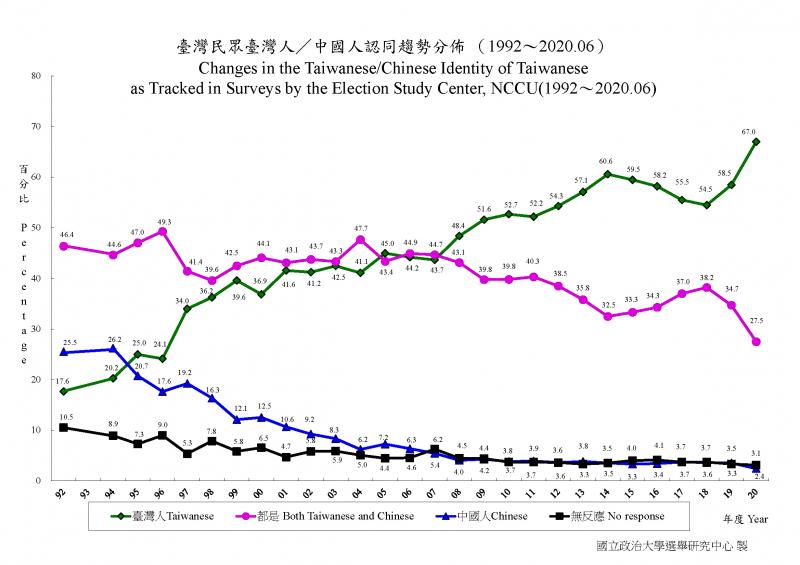A record number of people in the nation now regard themselves as “Taiwanese,” rather than “Chinese,” a survey released on Friday by National Chengchi University’s Election Study Center showed.
A record 67 percent of the population identify as “Taiwanese,” while only 2.4 percent consider themselves to be “Chinese,” the center said, citing the survey’s findings.
The center has been conducting the survey once or twice a year since June 1992, and uses the data to study trends in the self-identity of Taiwanese, it said.

The most recent results represented an 8.5 percentage point increase in those identifying as “Taiwanese,” up from 58.5 percent, and a 3.3 percentage point decrease in those identifying as “Chinese,” down from 5.7 percent, in June last year.
The results showed that 27.5 percent of respondents consider themselves to be both “Taiwanese” and “Chinese,” down from 34.7 percent last year.
Those surveyed who would advocate Taiwanese independence — if pressed to choose that or unification — also increased, rising from 15.1 percent in 2018 to 27.7 percent this year, the center said, adding that a separate 7.4 percent hoped for independence “as soon as possible.”
Those wanting to “maintain the ‘status quo’ for now” accounted for 28.7 percent, while those hoping that the “status quo” could be maintained in perpetuity accounted for 23.6 percent.
Those wanting to “unify with China as soon as possible” accounted for 0.7 percent.
Asked which political party they supported, 36.8 percent said the Democratic Progressive Party — the highest since the center began the surveys — while 15.8 percent said the Chinese Nationalist Party (KMT) — the lowest since the start of the center’s surveys.
While 5.3 percent expressed support for the Taiwan People’s Party and 3.3 percent for the New Power Party, at 37.8 percent expressed a politically neutral stance and favored no particular party.
Asked about the survey yesterday, Premier Su Tseng-chang (蘇貞昌) said that an increase in Taiwanese national consciousness was “a matter of course,” and that “with an enemy at the nation’s doors, the people were bound to unite.”
All Taiwanese share the same fate and are “one people under one nation” that would face threats together, he said.
Su gave the example of the COVID-19 pandemic, saying that everyone in Taiwan kept pace, and supported containment and prevention measures.
“Only by coming together can we stay strong and make progress,” Su added.
Additional reporting by Tsai Chang-sheng

DAREDEVIL: Honnold said it had always been a dream of his to climb Taipei 101, while a Netflix producer said the skyscraper was ‘a real icon of this country’ US climber Alex Honnold yesterday took on Taiwan’s tallest building, becoming the first person to scale Taipei 101 without a rope, harness or safety net. Hundreds of spectators gathered at the base of the 101-story skyscraper to watch Honnold, 40, embark on his daredevil feat, which was also broadcast live on Netflix. Dressed in a red T-shirt and yellow custom-made climbing shoes, Honnold swiftly moved up the southeast face of the glass and steel building. At one point, he stepped onto a platform midway up to wave down at fans and onlookers who were taking photos. People watching from inside

A Vietnamese migrant worker yesterday won NT$12 million (US$379,627) on a Lunar New Year scratch card in Kaohsiung as part of Taiwan Lottery Co’s (台灣彩券) “NT$12 Million Grand Fortune” (1200萬大吉利) game. The man was the first top-prize winner of the new game launched on Jan. 6 to mark the Lunar New Year. Three Vietnamese migrant workers visited a Taiwan Lottery shop on Xinyue Street in Kaohsiung’s Gangshan District (崗山), a store representative said. The player bought multiple tickets and, after winning nothing, held the final lottery ticket in one hand and rubbed the store’s statue of the Maitreya Buddha’s belly with the other,

‘COMMITTED TO DETERRENCE’: Washington would stand by its allies, but it can only help as much as countries help themselves, Raymond Greene said The US is committed to deterrence in the first island chain, but it should not bear the burden alone, as “freedom is not free,” American Institute in Taiwan Director Raymond Greene said in a speech at the Institute for National Defense and Security Research’s “Strengthening Resilience: Defense as the Engine of Development” seminar in Taipei yesterday. In the speech, titled “Investing Together and a Secure and Prosperous Future,” Greene highlighted the contributions of US President Donald Trump’s administration to Taiwan’s defense efforts, including the establishment of supply chains for drones and autonomous systems, offers of security assistance and the expansion of

Japan’s strategic alliance with the US would collapse if Tokyo were to turn away from a conflict in Taiwan, Japanese Prime Minister Sanae Takaichi said yesterday, but distanced herself from previous comments that suggested a possible military response in such an event. Takaichi expressed her latest views on a nationally broadcast TV program late on Monday, where an opposition party leader criticized her for igniting tensions with China with the earlier remarks. Ties between Japan and China have sunk to the worst level in years after Takaichi said in November that a hypothetical Chinese attack on Taiwan could bring about a Japanese